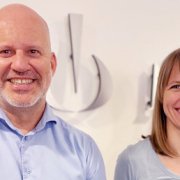Eli Lilly & Company in the IMPRESS study
Eli Lilly & Company is now part of the national Norwegian IMPRESS study.
Eli Lilly & Company is already part of CONNECT, the national collaboration on implementing precision medicine in Norway. Now, the international pharmaceutical company is offering participants of the IMPRESS study a new and promising medicine. This is good news for cancer patients in Norway.
Read more about CONNECT on their website.
The IMPRESS study is a national clinical study looking into the effect of cancer precision medicine. Patients with advanced, incurable cancer will – through the study – get the opportunity to test new treatments for their type of cancer.
Finding new and effective forms of treatment
The goal of the IMPRESS study is to test whether so-called off-label medications can be effective on new patient groups, based on their type of cancer and genetic mutations (molecular profile). This means that the participants of the study are testing out medications approved for the treatment of other diseases to fight their specific cancer disease. In other words, it’s not the type of cancer, but the genes that determine which medicine the patient receives.
“Impress is an important study for Norwegian researchers, not to mention for Norwegian cancer patients,” said Lars-Petter Strand, Medical Director Oncology in Eli Lilly Norway, in a press release from the company.
The intention is to find effective forms of treatment adapted to each individual’s cancer – a form of precision medicine. CONNECTs partner, Eli Lilly & Company, is now offering the participants of the study a new medication. This is great news for all the participants.
Up to 24 patients
Eli Lilly & Company is giving up to 24 participants the opportunity to try out the lung cancer medication Selpercatinib, sold under the product name Retsevmo. In previous studies, this medication has shown very good effects.
In order to treat as many patients as possible, access to medication is crucial. A wider range of medications to test contributes to more patients being able to receive treatment. Eli Lilly & Company’s support for IMPRESS is therefore of great importance.
“We are thrilled that Lilly supports IMPRESS Norway! We are seeing very good effects from the use of Selperkatinib through the completed studies, and we are pleased to be able to offer this medication to the patients participating in the IMPRESS study,” said Åslaug Helland Nasjonal, Project Leader for IMPRESS-Norway, in the press release.
In the same press release, Lars-Petter Strand emphasizes the importance of the IMPRESS study.
“Impress is an important study for Norwegian researchers, not to mention for Norwegian cancer patients, where the benefit and risk of tumor agnostic-targeted treatment will be investigated,” Strand said, and added:
“IMPRESS also emphasizes the importance of the hospitals and the pharmaceutical industry having an open dialogue about data and research, in order to contribute to the best possible treatment for Norwegian cancer patients.”



 Novartis
Novartis







